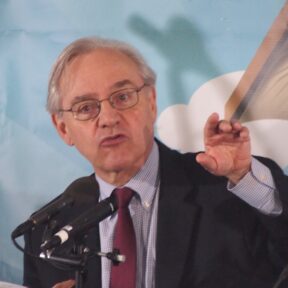
E.J. Dionne
: Photo from Wikimedia Commons / Author of Photo: Slowking4Overview
* Washington Post writer whose columns are carried by approximately 100 other newspapers
* Senior Fellow at the Brookings Institution think tank, where he co-chairs the Pew Forum on Religion and Public Life
* Author of several books
Eugene J. Dionne, Jr. is a political commentator who writes an opinion column that appears Tuesdays and Fridays in the Washington Post. He is also a frequent guest on National Public Radio. Very critical of Republicans generally (and President Bush in particular), Dionne’s views tend to be consistent with those of the Democratic Party.
Dionne was born in Boston in 1952 and grew up in Fall River, Massachusetts. In 1973 he graduated summa cum laude from Harvard University. He then won a Rhodes Scholarship to attend Oxford University in England, where he earned a doctorate in 1982.
Dionne worked as a New York Times reporter from 1976 until 1990, at which time he took a job as a reporter for the Washington Post. Three years later he became a Post columnist. From 1994 to 1995 he was a guest scholar at the Woodrow Wilson International Center.
Since 1996 Dionne has been a Senior Fellow at the Brookings Institution, where he is currently one of two Chairs of the Pew Forum on Religion and Public Life.
He has co-edited a number of books, including: What’s God Got to Do with the American Experiment (with John DiIulio, Jr., Brookings, 2000); Sacred Places, Civic Purposes: Should Government Help Faith-Based Charity? ( with Ming Hsu Chen, Brookings, 2001); Bush v. Gore (with William Kristol, Brookings, 2000); One Electorate Under God: A Dialogue on Religion and American Politics (Pew Forum, 2004); and other works.
Dionne is also the author of several books, among them:
(a) Why Americans Hate Politics: The Death of the Democratic Process (1991): This book analyzes the growing public cynicism caused by negative campaign advertising and politicians’ deceitful tactics.
(b) They Only Look Dead: Why Progressives Will Dominate the Next Political Era (1996): This book predicts the coming of a “second progressive era,” asserting that “[t]he radicalization of American politics now under way becomes explicable when it is seen as a response to a political situation saturated in both cynicism and uncertainty.”
(c) Stand Up, Fight Back: Republican Toughs, Democratic Wimps, and the Politics of Revenge (2004): This book poses the question, “Why have Democrats, too often, been such a feeble opposition? And why has revenge become such a consuming force in our political life?” Moreover, it advocates the Democratic Party program of higher taxes, forced redistribution of wealth, and ever-expanding government and political paternalism.
The frustration that Dionne expressed in the latter book stemmed from his view that the Democratic Party “that once galvanized a nation by declaring that there is nothing to fear but fear itself, became afraid — afraid of being too liberal, of being weak on defense, of being culturally permissive, of being seen as apologizing for big government.”
In Dionne’s calculus, economic inequality is an intractable feature of American life. In May 2007 he wrote: “‘Rising inequality’ is a bloodless term. But consider the facts behind the phrase: In 2005, the richest 1 percent of Americans had 19 percent of the nation’s income, the largest share since 1929; the poorest 20 percent had only 3.4 percent. … History suggests that concentrating wealth and income in a small group of privileged people is bad for economic growth.”
Dionne sees increased government intervention as the best solution to this purported injustice. He lauds what he considers the very useful recommendations of an April 2007 anti-poverty report issued by the Center for American Progress. This report advocates some $90 billion in additional government spending to do the following: raise the minimum wage; make unionization easier; provide financial assistance for “16- to 24-year-olds near or below the poverty line who are out of school and out of work”; expand financial assistance to cover the costs of child-care; and promote “early education for all.”
Today E.J. Dionne lives in Bethesda, Maryland with his wife and three children.